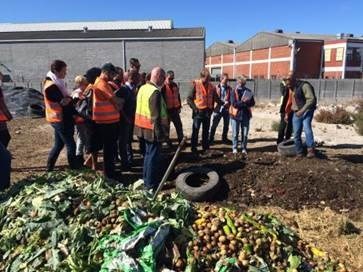
The first stop was the Cape Town Market, one of the oldest and largest fresh produce markets in South Africa that services 50% of the Western Cape.
"The market has extensive plans in place to assist with the reduction of organic waste going to landfill," says Adrian de Villiers from Cape Town Market. "Products that are unfit for sale but still fit for consumption are diverted to the FoodBank, which is located onsite and who distributes donated items to beneficiary organisations.
"Foods that are unfit for consumption are either diverted to pig farms or to the market's onsite composting system managed by Y-Waste. During March 2014 to February 2015, only 1.8% of all produce delivered was unfit for sale. This was due to no market demand, poor handling, decay or low grade quality," De Villiers explains.
After the Cape Town Market tour, the waste enthusiasts were taken to the Athlone Refuse Transfer Station (ARTS) and Vissershok landfill to experience how waste is managed by the City of Cape Town. Where distances for refuse collection vehicles are too great to access disposal, they make use of a transfer station to offload waste. At transfer stations, the waste is compacted into containers of approximately 20 tons each and transferred via rail or road to a landfill site. Approximately 50 containers of compacted waste are transported every night via rail from ARTS to the Vissershok landfill site.
At the Vissershok landfill, the attendees were taken to the working face, rehabilitated cells and the leachate treatment plant where leachate generated by the site is biologically treated to meet the Department of Water and Sanitation's special limit effluent standards.
"South Africa is running out of landfill airspace and we all need to do our part to reduce waste going to landfill. The aim of the tour was to track a waste product from cradle to grave/cradle and introduce solution providers that are doing their part to reduce waste going to landfill," says Quinton Williams, committee member of the WMRIG group.